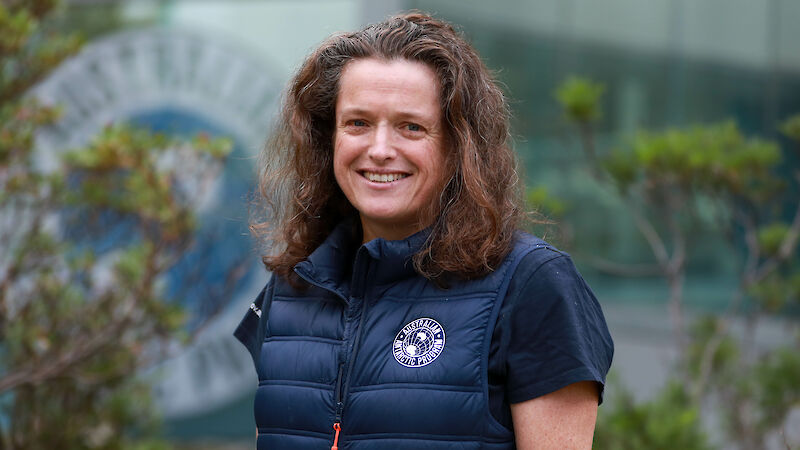Dr Anna MacDonald

As a molecular ecologist, I use genetic methods to address ecological questions and to inform wildlife management. We still have much to learn about the organisms that inhabit Antarctica and the Southern Ocean, and the threats they face. DNA can tell us about the species living in different ecosystems, what they eat, how they interact with other species, and how ‘healthy’ their genetic diversity is.
Environmental DNA (eDNA) samples are samples collected from the environment: these include DNA isolated from water, soil, sediment, and even from the air. At the Australian Antarctic Division, we use eDNA to understand and characterise marine, terrestrial and freshwater biodiversity. We can also isolate DNA from predator faeces. This provides information about predators and also about the species they eat. For example, we use DNA from penguin poo to understand how penguins rely on different species of krill and fish for food. This can help to identify the impacts of fisheries and other human activities on penguin populations. Genetic research can also inform conservation and management of threatened species. For example, measuring genetic diversity within and among albatross populations can help to tailor management strategies for different species, and to understand potential threats.
More broadly, my research highlights the importance of genetic diversity to species resilience and adaptability. As a member of international collaborations, I work to develop standardised and accessible tools to improve the way we evaluate, monitor, and protect genetic diversity.
My background is in molecular ecology and conservation genetics. I received my PhD in Applied Science from the University of Canberra in 2008. Before moving to the Australian Antarctic Division in 2021, I worked as a geneticist on a range of wildlife management projects, including using non-invasive DNA samples to detect and monitor non-native species, and on conservation genetics of threatened mammals, reptiles and fish. From 2017-2020, I was based at the Australian National University managing projects and coordinating research for the Oz Mammals Genomics Initiative, which developed genomic datasets to address conservation questions for Australian marsupials, rodents and bats.
Current Projects
#4651: Heard Island and McDonald Islands (HIMI) 2025-26 Campaign
#4644: Antarctic Nearshore and Terrestrial Observing System - East Antarctica (East-ANTOS)
#4636: Sustainable Management of Antarctic Krill and Conservation of the Krill-based Ecosystem
#4633: BEAUT - Biodiversity of East Antarctica: Underwater and Terrestrial
#4622: A Cleaner Antarctica
#4556: Shaping the future use of environmental DNA (eDNA) in Southern Ocean ecosystem monitoring
Key Outcome Areas
Collaborations and publications
Representations
- GEO BON Genetic Composition Working Group (co-chair)
- IUCN-SSC Conservation Genetics Specialist Group
- Coalition for Conservation Genetics
- Genetics Society of AustralAsia
Collaborations - National
- Australian National University
- CSIRO
- Department of Natural Resources and Environment Tasmania
- James Cook University
- University of Adelaide
- University of Canberra
- University of Sydney
- University of Tasmania
- University of Wollongong
Collaborations - International
- British Antarctic Survey
- Centre National de la Recherche Scientifique, France
- Korea Polar Research Institute
- National Antarctic Scientific Center of Ukraine
- National Institute of Polar Research, Japan
- NatureScot, Scotland
- National Oceanic and Atmospheric Administration, US
- South African National Biodiversity Institute
- University Freiburg, Germany
- University of Waikato, NZ
Publications
The development of DNA markers to resolve uncertainties of seabird bycatch identification from longline fisheries in Australian watersv. Polanowski AM, MacDonald AJ, Double MC, et.al. Ecology and Evolution (2024) 14(11): e70568
A pragmatic approach for integrating molecular tools into biodiversity conservation. Bertola LD, Brüniche-Olsen A, Kershaw F, Russo I-RM, MacDonald AJ, et.al. Conservation Science and Practice (2024): 6 (1): e13053
An expert-driven framework for applying eDNA tools to improve biosecurity in the Antarctic. Clarke LJ, Shaw JD, Suter L, et. al. Management of Biological Invasions (2023): 14 (3): 379–402
Best practice guidelines for environmental DNA biomonitoring in Australia and New Zealand. de Brauwer M, Clarke LJ, Chariton A, et.al. Environmental DNA (2023): 5 (3) 417-423
Environmental DNA of Antarctic krill (Euphausia superba): Measuring DNA fragmentation adds a temporal aspect to quantitative surveys. Suter L, Wotherspoon S, Kawaguchi S, King R, MacDonald AJ, Nester GM, Polanowski AM, Raymond B, Deagle BE. Environmental DNA (2023): 5 (5): 945-959
See more on Google Scholar and ResearchGate
